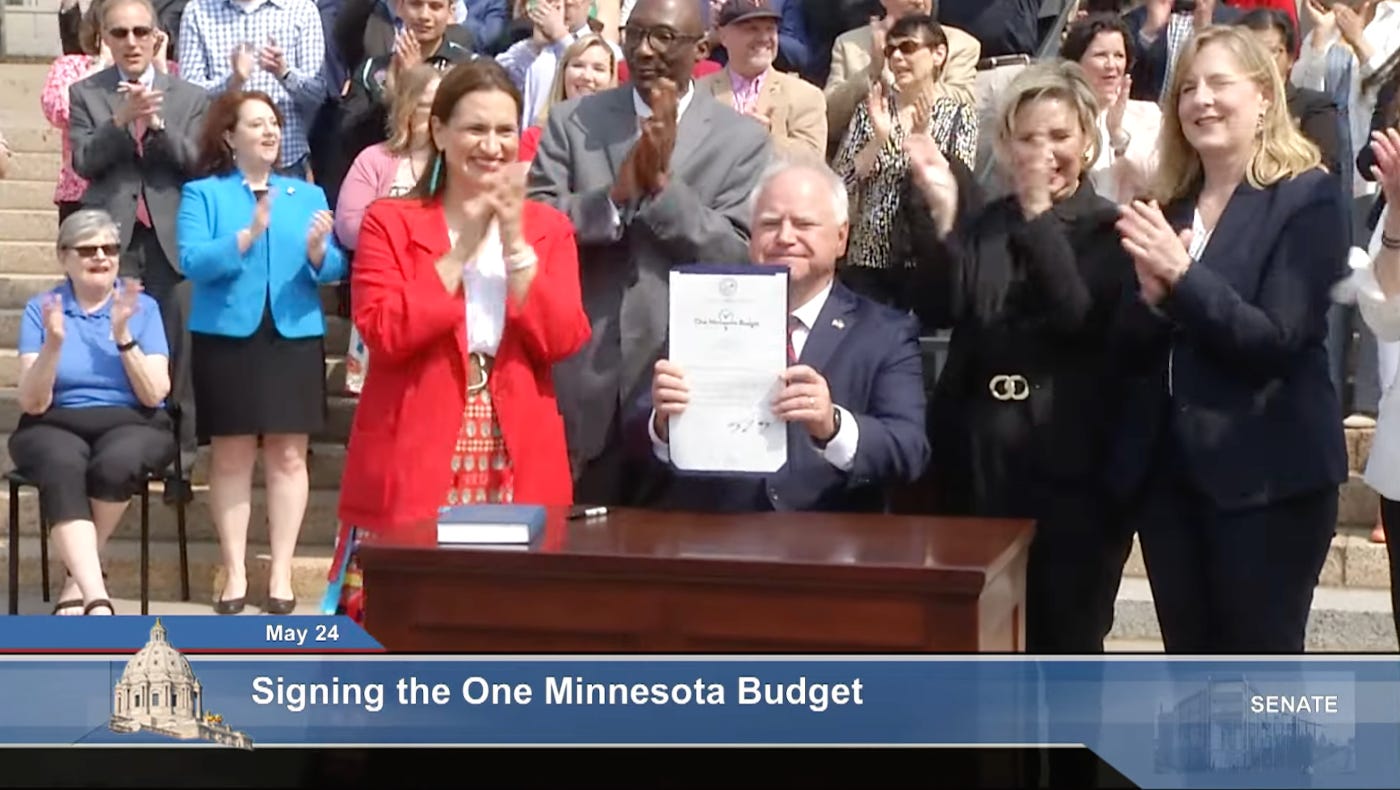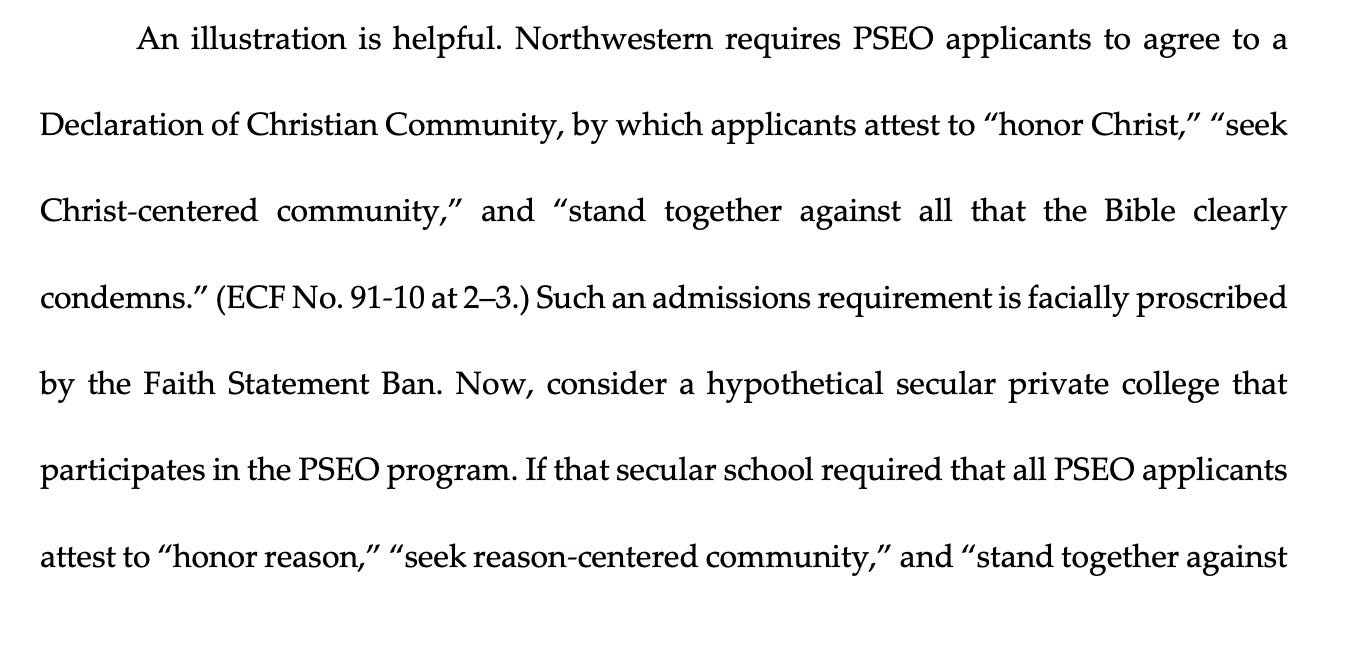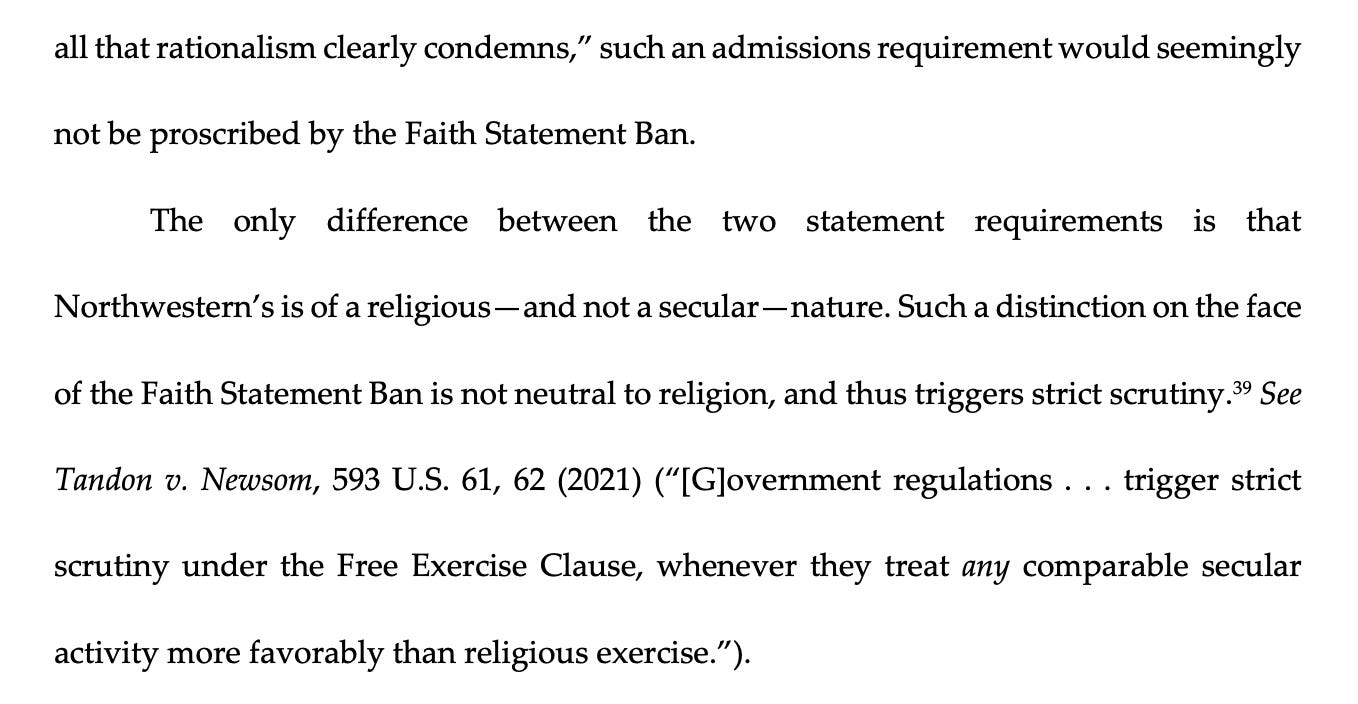Federal judge strikes down Minnesota's sensible "faith statement" ban for PSEO schools
The ruling lets Christian schools take taxpayer dollars despite making high schoolers sign bigoted religious statements if they want college credit
This newsletter is free and goes out to over 22,000 subscribers, but it’s only able to sustain itself due to the support I receive from a small percentage of regular readers. Would you please consider becoming one of those supporters? You can use the button below to subscribe or use my usual Patreon page!
A federal judge has ruled that religious schools in Minnesota that require students to sign statements of faith are, in fact, eligible for a state-run reimbursement program meant to benefit high school students. It’s a disappointing result that further erodes church/state separation.
The lawsuit was first filed two years ago shortly after lawmakers passed a law that would benefit students across Minnesota.
The case revolved around a small provision tucked away in a $72 billion two-year budget signed into law in May of 2023 by Governor Tim Walz, long before he was a vice presidential candidate. The provision regarded the state’s PSEO program.

Since 1985, the Postsecondary Enrollment Options Act (which created the PSEO program) has allowed high school students to take college-level classes taught by college professors (online or in-person) and get credit for them. (It’s similar to the privately-run Advanced Placement program.)
Students enrolled in PSEO classes have their tuition, books, and fees covered by the institutions—which are reimbursed by the state—and they’re expected to do college-level work. They’re also expected to “meet the admissions standards” of whatever school is offering the classes. If they earn a good grade, it counts as college credit.
These programs are ideal for high-achieving students looking to save tuition dollars at a state university—or students curious to know what the rigor of a college course is like. It’s also a way for students who might not be able to afford a two- or four-year post-secondary education to get a head start with some free classes.
An article in the Mankato Free Press in 2023 quoted one Minnesota State University graduate saying “he’s saved $20,000 by having taken nearly 80 PSEO credits” and that, when you include scholarship money, “his college degree has cost him very little.” That’s how powerful this program can be for students who take advantage of it.
In 2020 alone, 10,463 students took 170,117 credits of classes, and the state paid out just over $36 million in reimbursements to the participating colleges and universities.
So why did lawmakers make a change to the program?
It had everything to do with church/state separation.
The provision in the state budget simply said that any colleges participating in PSEO could not require students to sign a faith statement as a requirement for admission.
To put that another way, a private Christian college could still participate in PSEO and offer classes to high school students… but that school couldn’t make participating students say they agreed with the specific religious requirements of the college. (Some Christian schools require students to say they oppose same-sex marriage, abortion rights, and the idea that transgender people exist.)
The law also said religious schools couldn’t reject a participating high school student because that student was gay or trans or an atheist—even if those students wouldn’t be allowed to attend those colleges because of that.
This wasn’t an attack on religious institutions. It was a way to make sure the state wasn’t handing over taxpayer dollars to schools that were imposing their religious beliefs on high school students. (For anyone curious, the PSEO program does not allow any courses that are “sectarian in nature.” But religious schools can still offer secular courses. Students, for example, could take a college-level math class from a religious school, and there would be no problem at all.)
But because Christian institutions always see themselves as victims, two of them sued the state over the change.
The University of Northwestern–St. Paul and Crown College, both of which are conservative Christian schools, said in the lawsuit that the new provision was unconstitutional:
Today, Minnesota governor Tim Walz signed a bill into law that amends the law governing PSEO to exclude religious schools like Northwestern and Crown from participating because they require a statement of faith from those students who chose to attend their on-campus programs. The statements simply ask students to affirm the schools’ religious beliefs for the purpose of upholding their Christian communities. Other schools are free to create the campus environment they want to attract students with shared values and interests. Minnesota’s sudden change to the law hurts students who want to attend schools that uphold their religious values–schools that have attracted thousands of Minnesota high school students over the past three and a half decades.
The argument they made was that if Minnesota was offering a program that applied to all institutions of higher learning that wanted to participate, they couldn’t exclude some just because they required students to affirm their Christianity (and openly declare their anti-LGBTQ bigotry).
At Crown College, for example, the Statement of Faith specifically bans “all sexual relations outside the bounds of marriage between a man and a woman,” which means openly gay students who are, or hope to one day be, in a relationship could not gain acceptance.
The University of Northwestern-Saint Paul is even more straightforward: Marriage is “between one man and one woman” and “same sex romantic intimacy and/or sexual relations” is forbidden.
Both schools said in the lawsuit that their Statements of Faith only applied to students taking classes on campus, not those taking classes online. But that still meant high school students taking an ostensibly secular course like “Beginning Chinese I” as an on-site PSEO would have to agree to the sex rules. That’s what the state was objecting to with the budget provision. (Northwestern-Saint Paul later insisted their sex rules would not apply to LGBTQ+ students attending classes on campus, presumably because they only have a problem with people who act on their desires.)
The right-wing legal group Becket, which represents the schools, said rather bluntly that the law was on their side: “The Supreme Court has consistently and recently affirmed that public benefits that are open to private secular organizations must also be open to religious ones.“
The lawsuit even suggested the lawmakers were anti-religious:
Indeed, during meetings of the Senate Committee on Education Policy, members of the committee stated clearly their intent to exclude religious schools from receiving public dollars.
The problem with that logic was that religious schools were still eligible to participate in PSEO. No one pushed them out! There were several faith-based colleges in Minnesota that weren’t suing over the budget because they had no plans to discriminate against students who didn’t fall in lock-step with their beliefs.
There were only two schools that had an anti-LGBTQ Statement of Faith that they wanted students to sign—and it was the two suing the state. Both of them had a lot to lose, too. Since 2017, Northwestern-Saint Paul had received over $33 million in PSEO reimbursements while Crown had received nearly $6 million.
When the lawsuit was filed, the Secular Government Caucus in Minnesota—headed up by Rep. Mike Freiberg, Rep. Athena Hollins, Sen. Jen McEwen, and Sen. John Marty—released a statement echoing that very point:
The state is not restricting these schools from practicing their religious beliefs in any manner. It is merely prohibiting them from using state PSEO dollars to exclude high school students based on a student's race, creed, ethnicity, disability, gender, or sexual orientation or religious beliefs or affiliations.
Most of the religiously affiliated colleges that participate in the PSEO program have not excluded PSEO students, and they are not involved in this lawsuit. They recognize that the public funding requires them to treat students equally.
Ironically, the schools bringing this lawsuit are the colleges who have excluded PSEO students based on religion. Their required faith statements have excluded high school students from participating in the publicly funded PSEO program, and they will no longer be allowed to continue. Religious freedom guarantees all people the right to believe and practice any faith or none at all, and institutions participating in this program must abide by that.
Simply put, there was nothing anti-Christian about the PSEO provision in the state budget. Christian schools that wanted to participate in the program could still do so, under the same rules as everyone else. Christian schools that wanted to discriminate against students who didn’t agree with their beliefs about sexuality could not.
It was up to them whether or not a religious litmus test mattered more than government funding, but they didn’t deserve to have it both ways.
The Freedom From Religion Foundation filed an amicus brief in the case urging the court to side with the state. (They were not directly involved in the case, but they had a vested interest in the outcome.) FFRF attorney Patrick Elliott made two key points in his brief.
First, FFRF said that the Minnesota law was neutral when it applied those non-discrimination conditions on funding PSEO. They weren’t targeting Christian schools:
Minnesota’s amendment… does not reflect an organized and malicious effort to target religious schools; but rather, reflects the principle that students should have equal access in pursuing educational opportunities… As the amendment prohibits discriminatory conduct for all schools interested in hosting PSEO programs, regardless of belief system, the rules are neutral and generally applicable.
Second, FFRF argued that the state had a “significant interest” in not funding and perpetuating discrimination in publicly funded programs:
Government funds should not be used to demand adherence to identities and religious beliefs from students who have valid personal reasons to apply for an institution's secular PSEO program—such as proximity to their primary school, transportation, unique course offerings, specific faculty, or seeking co-enrollment with peers—but who do not share the institution's underlying religious beliefs.
Further, [the provision] prohibits all participating schools from basing admissions to a PSEO program on the basis of a student's race, creed, ethnicity, disability, gender, or sexual orientation or religious beliefs or affiliations, regardless of the school’s reasoning for discrimination. There is no mechanism for individualized exceptions, strengthening the State’s blanket equality interest.
Again, Christian schools shouldn’t be able to have it both ways. They needed to agree to the state’s rules or they could choose not to participate in the program. There’s no Jesus Exception in state law for bigots who want access to taxpayer dollars.
So what did the judge say?
On Friday, U.S. District Judge Nancy Brasel (a Trump-appointed judge, though one recommended by Democratic Senator Amy Klobuchar) ruled in favor of the Christian schools, saying the law forbidding participating PSEO schools from making students sign faith statements was unconstitutional. She also said that, because the non-discrimination rule was tied to it, the entire amendment had to go.
In essence, she echoed what the Supreme Court has said for years now. You don’t have to give taxpayer dollars to private schools, but once you do, you can’t exclude religious schools just because they’re imposing their religious rules.
At one point, the state argued that their provision wasn’t meant to target religious schools; they just wanted to uphold secular laws. But the judge said the amendment did go after religious schools… and she used a bizarre analogy to make the point:
An illustration is helpful. Northwestern requires PSEO applicants to agree to a Declaration of Christian Community, by which applicants attest to “honor Christ,” “seek Christ‐centered community,” and “stand together against all that the Bible clearly condemns”… Such an admissions requirement is facially proscribed by the Faith Statement Ban. Now, consider a hypothetical secular private college that participates in the PSEO program. If that secular school required that all PSEO applicants attest to “honor reason,” “seek reason‐centered community,” and “stand together against all that rationalism clearly condemns,” such an admissions requirement would seemingly not be proscribed by the Faith Statement Ban.
The only difference between the two statement requirements is that Northwestern’s is of a religious—and not a secular—nature. Such a distinction on the face of the Faith Statement Ban is not neutral to religion, and thus triggers strict scrutiny…
It’s a bizarre example because the religious Declaration excludes anyone who isn’t Christian while the fictional secular Declaration excludes nobody. (If you’re not interested in “reason,” what the hell are you even doing seeking a higher education?) Even in her made-up scenario, the secular school doesn’t do what the religious schools are doing. The judge says in a footnote that “a devout Christian PSEO applicant would be discriminated against” at the secular school, but only because she assumes that belief in God is in opposition to “reason.” While I happen to agree with that, plenty of Christians would tell you there’s no contradiction between their faith and reason! My point is: Even when she’s trying to make the case that the Minnesota law is discriminating against the religious schools, she can’t do it, even with her own hypotheticals.
There is a potential path forward, though.
If lawmakers say that PSEO reimbursements can only go to public colleges and universities, then the religious schools would be shut out altogether along with other private schools. (The judge noted that there are currently 18 private schools that participate in the program, and some of them are the only geographic options for students in those parts of the state.)
The question is whether it’s more important to Minnesota legislators to make PSEO money available to as many students and schools as possible, even if that means including religious schools with strict rules about sex and LGBTQ people, or whether they’d like to limit students’ options in order to defend the principle of non-discrimination, even if that means cutting off some students who have no PSEO options outside of local private colleges.
Right now, the judge has forced the first option on everyone. But lawmakers could theoretically override that by adopting the second option. It’s not clear, though, if they want to do that.
FFRF’s legal director Patrick Elliott told me in a statement that he didn’t buy the judge’s ruling and called on the legislature to take action:
We believe the district court is wrong. This law is neutral and generally applicable. It simply requires that all colleges receiving taxpayer funds treat students equally, regardless of religion, gender, or sexual orientation. No school should get a license to discriminate on the public dime.
Minnesota taxpayers have paid nearly $39 million to these two discriminatory colleges since 2017. Given the significant amount of money going to two schools that dominate the program, it is time for the Minnesota Legislature to step in and make sure that only public colleges and universities participate in future years.
FFRF said in a separate statement that if the state appeals the decision, they will once again file an amicus brief to support that effort.
This ruling is frustrating for obvious reasons, but it’s also a moral indictment of how far Christian schools are willing to go to secure public funding while enshrining their right to discriminate. They want to have their cake and eat it too. They want taxpayer dollars while openly making life worse for some of the most vulnerable people in society by demanding ideological conformity as the price of entry. They want the state funds without the same accountability to public values that every other school upholds.
It’s not religious freedom. It’s taxpayer-subsidized prejudice under the umbrella of faith.
Like so many legal arguments we’ve seen in the past decade, “religious liberty” has been weaponized to normalize discrimination and force all taxpayers—Christian, atheist, Jewish, Muslim, or otherwise—to bankroll faith-based exclusion.
Christian schools that want to uphold bigotry should have to do so on their own dime. Demanding the public pay for their intolerance is despicable—and a perfect example of what their religion has come to represent in this era.
(Portions of this article were published earlier)




"When a Religion is good, I conceive that it will support itself; and when it cannot support itself, and God does not care to support, so that its Professors are oblig'd to call for the help of the Civil Power, 'tis a Sign, I apprehend, of its being a bad one."
-- Benjamin Franklin, in a letter to Dr. Richard Price (a Christian) dated October 9th, 1780
When it comes to this subject, I always lead off with those words of wisdom from that wily Deist Franklin.
A Trump appointed judge pretzels their logic to give a veneer of legal justification to the hole in the wall of separation that SCOTUS made. That tracks. Typical fundie Christian Nazionalist. Equating a discriminatory statement of faith with a hypothetical statement of reason. It's almost as if the Christian Nazionalists want to prohibit thinking.
𝐼𝑡’𝑠 𝑛𝑜𝑡 𝑟𝑒𝑙𝑖𝑔𝑖𝑜𝑢𝑠 𝑓𝑟𝑒𝑒𝑑𝑜𝑚. 𝐼𝑡’𝑠 𝑡𝑎𝑥𝑝𝑎𝑦𝑒𝑟-𝑠𝑢𝑏𝑠𝑖𝑑𝑖𝑧𝑒𝑑 𝑝𝑟𝑒𝑗𝑢𝑑𝑖𝑐𝑒 𝑢𝑛𝑑𝑒𝑟 𝑡ℎ𝑒 𝑢𝑚𝑏𝑟𝑒𝑙𝑙𝑎 𝑜𝑓 𝑓𝑎𝑖𝑡ℎ.
All because they want to force everyone to conform to their narrow little boxes.